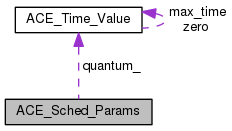Container for scheduling-related parameters.
ACE_Sched_Params are passed via <ACE_OS::sched_params> to the OS to specify scheduling parameters. These parameters include scheduling policy, such as FIFO (ACE_SCHED_FIFO), round-robin (ACE_SCHED_RR), or an implementation-defined "OTHER" (ACE_SCHED_OTHER), to which many systems default; priority; and a time-slice quantum for round-robin scheduling. A "scope" parameter specifies whether the ACE_Sched_Params applies to the current process, current lightweight process (LWP) (on Solaris), or current thread. Please see the "NOTE" below about not all combinations of parameters being legal on a particular platform. For the case of thread priorities, it is intended that <ACE_OS::sched_params> usually be called from <main> before any threads have been spawned. If spawned threads inherit their parent's priority (I think that's the default behavior for all of our platforms), then this sets the default base priority. Individual thread priorities can be adjusted as usual using <ACE_OS::thr_prio> or via the ACE_Thread interface. See the parameter descriptions in the private: section below.
- Note:
- This class does not do any checking of parameters. It is just a container class. If it is constructed with values that are not supported on a platform, the call to <ACE_OS::sched_params> will fail by returning -1 with EINVAL (available through <ACE_OS::last_error>).
<scope_> must be one of the following: ACE_SCOPE_PROCESS: sets the scheduling policy for the process, and the process priority. On some platforms, such as Win32, the scheduling policy can only be set at process scope. ACE_SCOPE_LWP: lightweight process scope, only used with Solaris threads. ACE_SCOPE_THREAD: sets the scheduling policy for the thread, if the OS supports it, such as with Posix threads, and the thread priority. NOTE: I don't think that these are the same as POSIX contention scope. POSIX users who are interested in, and understand, contention scope will have to set it by using system calls outside of ACE.

 1.8.0-20120409
1.8.0-20120409